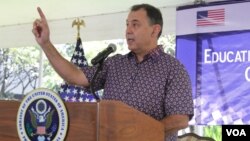William Heidt, ambassador of the United States to Cambodia, has called on politicians in Cambodia to use dialogue to solve political disputes, while the country is preparing for commune elections in June and national elections in 2018.
Heidt’s remarks came amid heightened political tensions ahead of the election.
Heidt told reporters during a press conference held at the U.S. Embassy on Friday that in the first year of his diplomatic mission in Cambodia he observed Cambodia lacking political dialogue between political parties.
“In this first year I've been here is the lack of genuine political reconciliation in Cambodia. What does that mean ‘political reconciliation’? First and foremost, it means all political forces. They need to accept the rights of the other to exist. And you've seen America right now, some very contentious and difficult political process is unfolding, but everyone accepts the rights of everyone to exist. And I think that’s the thing in Cambodia,” he said.
He said that he was disappointed that Cambodian politicians did not favor dialogue to cope with challenging issues.
“I've really been disappointed by the lack of genuine political reconciliation in Cambodia. The way you get reconciliation is through dialogue, by talking to each other like normal people, like regular people, sitting down across the table and talking.
Efforts to free opposition members from jail have stalled, while the party’s acting leader, Kem Sokha, has been removed from his official role as leader of the minority in parliament amid a raft of rumors of gambling and sex scandals in the party.
Prime Minister Hun Sen has also moved to rewrite the law on political parties, which would see politicians convicted of crimes barred from leading parties, thus excluding Sam Rainsy, the Cambodia National Rescue Party president, and potentially leading to the party being dissolved.
Hun Sen has also said he may seize the CNRP’s assets as payment for a damages claim against Rainsy for alleged defamation.
Sok Eysan, ruling Cambodian People’s Party spokesman, said the party would not open a dialogue if it included discussions about releasing convicted criminals, adding that the opposition’s boycott of parliament did not help foster dialogue.
“That place [parliament] would create chances for discussing and exchanging ideas in the name of a parliamentary mechanism. How can we negotiate if they do not show up?” he asked.
Eng Chhay Eang, a senior CNRP lawmaker, said he agreed with Heidt’s comments.
“We saw already that, in Cambodia, our politicians seem to not think about national and people’s issues. That’s why there is unending chaos,” he said.
Kem Sok, a political analyst, said on Sunday that the CPP was aiming to oppress the opposition.
“If they are preparing for an election, they will prepare themselves and organize a strategy to win the hearts of the people. They will organize a strategy to end problems for the people. But what they are doing now, it’s not about an election, but the continuation of power,” he said.




